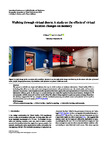Walking through virtual doors: A study on the effects of virtual location changes on memory
| dc.contributor.author | Watson, PWL | |
| dc.contributor.author | Gaudl, SE | |
| dc.contributor.other | Faculty of Science & Engineering | en_US |
| dc.date.accessioned | 2021-10-01T16:24:57Z | |
| dc.date.available | 2021-10-01T16:24:57Z | |
| dc.date.issued | 2021 | |
| dc.identifier.uri | http://hdl.handle.net/10026.1/17979 | |
| dc.description.abstract |
The spaces we inhabit can shape and influence the way in which we learn or reinforce information. Virtual reality (VR) is a technology that allows us to alter and create designed environments with great freedom over the visual, audio, and narrative elements. This freedom would benefit from further guidelines that detail approaches and implementations to best achieve desired information delivery goals. In this paper we present findings of a study that applies location-based memory strategies to VR environments, with the aim to aid word list recall without the subjects being required to apply any memory strategy themselves. Our findings suggest that VR may interfere with the incidental processing of multiple rooms and potential aid to recall as demonstrated in real world studies [PTT 16] [Smi82]. | en_US |
| dc.language.iso | en | |
| dc.publisher | University of Plymouth | en |
| dc.relation.uri | https://www.youtube.com/watch?v=M9whJPyB6E0 | en_US |
| dc.rights | CC0 1.0 Universal | * |
| dc.rights.uri | http://creativecommons.org/publicdomain/zero/1.0/ | * |
| dc.subject | Virtual Reality | en_US |
| dc.subject | Memory | en_US |
| dc.subject | Interactive Learning Environments | en_US |
| dc.title | Walking through virtual doors: A study on the effects of virtual location changes on memory | en_US |
| dc.type | Article | en_US |



